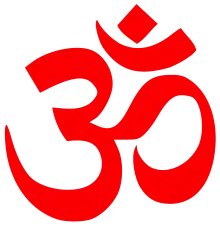Chiranjivi
Chiranjivi (Sanskrit nominative sing. ciranjīvi, चिरञ्जीवि) are, in Hinduism, seven immortals ones or long lived ones who are to remain alive on Earth until the end of the current Kali Yuga.
Etymology and scriptural context
The term is a combination of chiram, or 'permanent', and jīvi, or 'lived'. It is similar to amaratva, which refers to true immortality. At the end of the last Manvantara, a demon attempted to become immortal by swallowing the sacred pages of Vedas, as they escaped from the mouth of Brahma. The scripture was retrieved by the first avatar (Matsya) of Lord Vishnu. Incarnations of Vishnu (Narasimha and Rama) also later fought and killed two asuras, Hiranyakasipu and Ravana, who tried to become immortal through obeisance to Lord Brahma and Lord Shiva, respectively. In one sense immortal can mean "to live eternally until the destruction of Universes", i.e., all physical bodies are foretold to become immaterial at the end of time, along with the Brahma himself, with the destruction of the Universe.[1]
Attributes
The extant Puranas, the Ramayana, and the Mahabharata describe seven long-lived personalities in the Hindu pantheon. There are others as well, which are not included in the one particular shloka. Each represents a different attribute of man, which as long as they live, will exist amongst humanity.[2]
The Eight Chiranjivis
- Vyasa :- The sage who composed the Mahabharata. He represents erudition and wisdom. He was the son of sage Parashara and his intimate partner Satyawati, a fisherwoman.[3] and great-grandson of the sage Vashishtha. He was born towards the end of Treta Yuga, lived to see the complete Dvapara Yuga, and saw the initial phase of Kali Yuga.
- Hanuman :- One of the greatest brahmachari, served Rama. He stands for selflessness, courage, devotion, intelligence, strength, celibacy and righteous conduct.
- Parashurama :- The sixth avatar of Vishnu. He is knowledgeable of all astras, sastras and divine weapons. The Kalki Purana writes that he will reemerge at the end of time to be the martial guru of Kalki. He will then instruct the final Avatar to undertake penance to receive celestial weaponry, required to save mankind at the end time.
- Vibhishana :- The brother of Ravana. Vibhishana surrendered to Rama before his battle with Ravana. He was later crowned king of Lanka after Ravana was killed by Rama. He stands for righteousness. Vibhishana is not a true Chiranjivi, as his boon of longevity is to remain on the earth only until the end of the Maha Yuga.
- Ashwatthama :- The son of Drona, a great warrior. Drona did many years of severe penance to please Lord Shiva in order to obtain a son who possessed the same valor as Lord Shiva. Ashwatthama is the avatar of one of the eleven Rudras. Ashwatthama and Kripa are believed to be the lone survivors still living who had fought in the Kurukshetra War. He might be immortal but Krishna bestowed upon him a curse that, he would live forever but can neither communicate with anyone nor touch anything, with his body covered with painful sores and ulcers that would never [be] cure[d].[4]
- Mahabali :- The ruler of demons or asura who existed somewhere around present day Kerala. He was sent into Patal (The underworld) by the Vamana Avatar of Vishnu.
- Kripa :- The royal guru of the princes in the Mahabharata. He was adopted by King Shantanu. His sister was Kripi, who married Dronacharya. Together they gave birth to Ashwatthama. He is known for long life because of impartiality among his students and treated them as his own kids. He along with his nephew Ashwatthama are the lone survivors of all warriors who actually fought in Kurukshetra War.
- Markandeya :- Markandeya is an ancient rishi born in the clan of Bhrigu Rishi. The Markandeya Purana especially, comprises a dialogue between Markandeya and a sage called Jaimini, and a number of chapters in the Bhagavata Purana are dedicated to his conversations and prayers. He is also mentioned in the Mahabharata.
All chiranjivis are alive just to help Vishnu's tenth and Final Avatar or Kalki, to destroy sinners and restore dharma or righteousness on Earth and open the portal to the next Mahayuga (चतुर्युग) of Surya Savarnika Manavantara or Savarni Manavantara.
Mentions of Chiranjivi in Hindu scripture
Hindu scripture contains a mantra about the seven immortals, in which their names are recited for luck and longevity:
अश्वत्थामाबलिर्व्यासोहनुमांश्च विभीषण:कृपश्चपरशुरामश्च सप्तैतेचिरंजीविन:।
- Ashwathaama Balirvyaaso Hanumanshcha
- Vibhishanaha Krupascha Parshuramascha
- Saptaitey Chiranjivinaha
Apart from the seven Chiranjivis above mentioned, there exist other Chiranjivis as well. For instance, Sage Markandeya, who at the age of sixteen was blessed with immortality.
अश्वत्थामा बलिव्र्यासो हनूमांश्च विभीषण:। कृप: परशुरामश्च सप्तएतै चिरजीविन:॥ सप्तैतान् संस्मरेन्नित्यं मार्कण्डेयमथाष्टमम्। जीवेद्वर्षशतं सोपि सर्वव्याधिविवर्जित॥
- Ashwathaama Balirvyaaso Hanumanshcha Vibheeshanaha
- Krupaha Parshuramascha Saptaitey Chiranjivinaha
- Saptaitaan Samsmareynnityam Markandeymathaashtamam
- Jivedvarshshatam Sopi Sarvavyadhivivarjit
The above lines mean that by daily remembering these 8 immortals (Ashwatthama, King Mahabali, Vedvyasa, Hanuman, Vibhishana, Kripacharya, Parashurama and Rishi Markandaya) one can be free of all ailments and live for more than 100 years. These are also referred to as the 8 great warriors.
References
- Bhāgavata Purāṇa 3.32.8–10
- Malayalam book Bharata Paryatanam (A journey through the Mahabharata) by Kuttikrishana Marar.
- J. P. Mittal (2006). History of Ancient India (A New Version). Atlantic Publishers & Dist. ISBN 8126906162. Retrieved 2020-10-13.
- Indian Mythology: Tales, Symbols, and Rituals from the Heart of the Subcontinent. Inner Traditions/Bear & Co. 24 April 2003. p. 173. ISBN 9780892818709.

